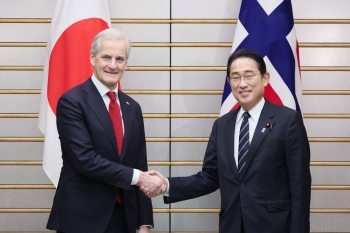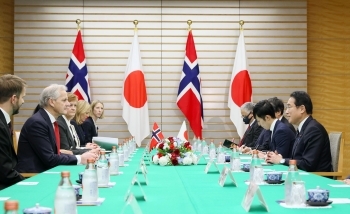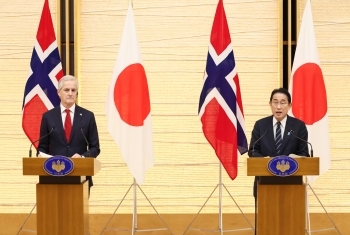Japan-Norway Relations
Japan-Norway Summit Meeting and Working Dinner
 Japan-Norway Summit Meeting
(Photo: Cabinet Public Affairs Office)
Japan-Norway Summit Meeting
(Photo: Cabinet Public Affairs Office)
 Japan-Norway Summit Meeting
(Photo: Cabinet Public Affairs Office)
Japan-Norway Summit Meeting
(Photo: Cabinet Public Affairs Office)
 Joint press announcement
(Photo: Cabinet Public Affairs Office)
Joint press announcement
(Photo: Cabinet Public Affairs Office)
On December 7, commencing at 6:35 p.m. for approximately 30 minutes, Mr. KISHIDA Fumio, Prime Minister of Japan, met with H.E. Mr. Jonas Gahr STØRE, Prime Minister of the Kingdom of Norway, followed by a working dinner held for approximately 60 minutes from 7:20 p.m. An overview of the events is as follows.
On this occasion, the two leaders issued the Joint Statement on the Strategic Partnership between the Government of Japan and the Government of the Kingdom of Norway (PDF)  .
.
1 Bilateral relations
Prime Minister Kishida cordially welcomed Prime Minister Støre's visit to Japan, and expressed his pleasure at having the opportunity to hold the meeting for the first time as well as his intention to steadily implement concrete cooperation, with the joint statement issued today as the new foundation. In response, Prime Minister Støre stated that Japan and Norway have a long history of friendship and that he would like to use today’s meeting as an opportunity to further develop bilateral relations. The two leaders welcomed the upgrading of Japan-Norway relations to a strategic partnership.
Prime Minister Kishida also stated that the two countries have potential for cooperation in a wide range of areas, including clean energy, green transition, and sustainable use of marine living resources, and the two leaders affirmed that they would deepen collaboration in these areas.
The two leaders concurred to start intergovernmental negotiations for the conclusion of a Japan-Norway Social Security Agreement and welcomed the start of the negotiations. They also welcomed the signing of the Green Strategic Partnership Joint Communique between the Japanese and Norwegian relevant authorities on the occasion of Prime Minister Støre's current visit to Japan and concurred to support the development of economic relations between the two countries.
Prime Minister Kishida expressed his desire to deepen dialogue with Norway in the security field, welcomed the recent significant progress in the Japan-NATO relations, and stated that he would like to closely collaborate with Norway, an original member of NATO. The two leaders concurred to further promote cooperation in the security field and in the context of the Japan-NATO cooperation.
2 Regional issues
Prime Minister Kishida stated that, amid an increasingly severe international security environment and that he welcomed the increasing interest and engagement of European countries, the EU and the NATO in the Indo-Pacific region. He also stated that it is extremely important for the international community as a whole to maintain and strengthen the free and open international order based on the rule of law. The two leaders also shared the recognition that any unilateral attempts to change the status quo by force or coercion is unacceptable.
With regard to Russia’s aggression against Ukraine, the two leaders shared the recognition on the importance of continuing severe sanctions against Russia and strong support for Ukraine under the unity of like-minded countries, to achieve a just and lasting peace as soon as possible.
The two leaders also exchanged their views on the situation in East Asia, particularly the current circumstances in the security field, and confirmed that they would continue to coordinate closely in dealing with North Korea, including on the nuclear and missile issues as well as the abductions issue.
Prime Minister Kishida expressed his unequivocal condemnation of the recent terror attacks committed by Hamas and others, and the two leaders shared the importance of ensuring the humanitarian pause that contributes to improving the humanitarian situation in Gaza and a calming down the situation as soon as possible.
3 Cooperation in the International arena
Both leaders shared the recognition that it is important to strengthen the functions of the United Nations, including Security Council reform, and also confirmed to work together toward the realization of a world without nuclear weapons.
Both leaders also affirmed that as maritime states, they concurred on continuing to work closely together with regard to the sustainable use of the Arctic and climate actions, including the decarbonization of shipping.
Prime Minister Støre expressed his high appreciation for Japan’s efforts to have been explaining to the international community about the discharge of ALPS treated water into the sea, based on scientific evidence.

